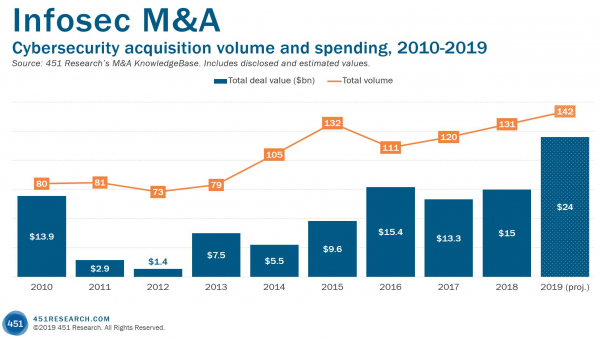by Brenon Daly
Fittingly enough, Palo Alto Networks took it to record levels. The next-generation information security kingpin has done more acquisitions than any other company in the sector this year, by our tally. And with its latest purchase – the $150m reach for Aporeto – the overall infosec M&A volume in 2019 has now matched the highest annual total in history.
According to 451 Research‘s M&A KnowledgeBase, Palo Alto’s purchase of micro-segmentation security startup Aporeto stands as the vendor’s fifth transaction in 2019. (451 Research subscribers can look for our full report on that acquisition later today on our site, including the prevailing valuation the company is paying.) No other buyer in the sector comes close to that cadence of more than one deal every quarter this year.
Even infosec acquirers with well-worn M&A playbooks are putting up a fraction of the number of prints that Palo Alto has done in 2019. For instance, since the start of the current decade, Symantec and Cisco top the list in the M&A KnowledgeBase of most-active infosec acquirers. Yet both of those once-active buyers have announced just a single transaction in the sector this year. (And, of course, Big Yellow doesn’t appear likely to add to its total anytime soon, following the sale of its enterprise security division to the sharp-penciled operators at Broadcom.)
In that way, Palo Alto has now emerged as the next-gen acquirer in the infosec market, just as it emerged as a next-gen vendor in the infosec market a decade ago. It has displaced the traditional providers of exits (Symantec, Cisco) as surely as it has displaced the traditional supplier of firewalls (Check Point Software). To underscore how the firewall market has shifted, consider this: 14-year-old Palo Alto Networks sells more than $1bn worth of gear each year than 26-year-old Check Point, and is growing more than three times faster.
Figure 1:

